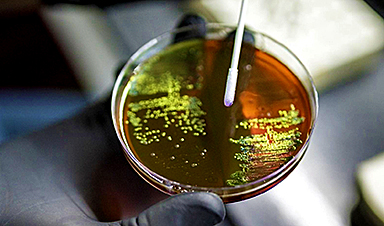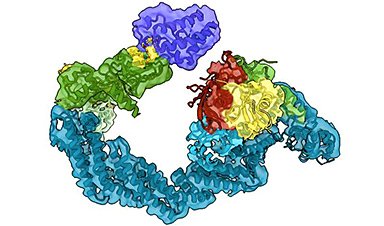A new class of nanosensor developed in Brazil could more accurately identify dengue and Zika infections, a task that is complicated by their genetic similarities and which can result in misdiagnosis.
The technique uses gold nanoparticles and can “observe” viruses at the atomic level, according to a study published in Scientific Reports.
Belonging to the Flavivirus genus in the Flaviviridae family, Zika and dengue viruses share more than 50 percent similarity in their amino acid sequence. Both viruses are spread by mosquitos and can have long-term side effects. The Flaviviridae virus family was named after the yellow fever virus and comes from the Latin word for golden, or yellow, in color.
“Diagnosing [dengue virus] infections is a high priority in countries affected by annual epidemics of dengue fever. The correct diagnostic is essential for patient managing and prognostic as there are no specific antiviral drugs to treat the infection,” the authors say.
More than 1.8 million people are suspected to have been infected with dengue so far this year in the Americas, with 4000 severe cases and almost 700 deaths, the Pan American Health Organization says. The annual global average is estimated to be between 100 million and 400 million dengue infections, according to the World Health Organization.
Flávio Fonseca, study co-author and researcher at the Federal University of Minas Gerais, tells SciDev.Net it is almost impossible to differentiate between dengue and Zika viruses.
“A serologic test that detects antibodies against dengue also captures Zika-generated antibodies. We call it cross-reactivity,” he says.
Image Credit: Stock Photo
![]()
News This Week
Harvard Study Links Popular Plastic Ingredient to DNA Damage
Phthalate affects egg formation in C. elegans, resulting in abnormal chromosome numbers. A recent study conducted on roundworms has discovered that a common plastic ingredient can cause DNA strand breaks, leading to egg cells with an abnormal [...]
New research finds that subtle eye movements optimize vision
Our ability to see starts with the light-sensitive photoreceptor cells in our eyes. A specific region of the retina, termed fovea, is responsible for sharp vision. Here, the color-sensitive cone photoreceptors allow us to [...]
Scientists Were Wrong: Plants Absorb 31% More CO2 Than Previously Thought
New research shows plants absorb 31% more CO2 than previously estimated, raising the global GPP to 157 petagrams per year. Using carbonyl sulfide as a proxy for photosynthesis, this study highlights tropical rainforests’ critical role [...]
Doctors test first mRNA vaccine against norovirus
According to the Robert Koch Institute (RKI), the norovirus, which is widespread worldwide, is the cause of a large proportion of gastrointestinal infections. Those who catch the virus suffer from nausea, diarrhea and vomiting. [...]
Study reveals resistance of Pseudomonas aeruginosa to common cleaning agents
A new study reveals widespread resistance of a major bacterial pathogen to the active ingredients in cleaning agents commonly used in hospitals and homes. The American Chemical Society Infectious Diseases published the research, led [...]
AI’s Next Frontier: System 0 and the Future of Human Thought
“System 0” represents an emerging cognitive tool powered by AI that works alongside human intuition and analysis to enhance cognitive abilities. This new system promises to support complex decision-making and problem-solving but requires careful [...]
The Global Nanomedicine Market: Key Players and Emerging Technologies in Healthcare
This article provides an overview of the global nanomedicine market, highlighting key players, emerging technologies, and the challenges and opportunities that influence its growth and commercialization in the healthcare sector. Nanomedicines are nanotechnology-based drug products [...]
Scientists Have Discovered Toxic “Forever Chemicals” in Bottled Water
Scientists have found toxic PFAS in drinking water samples from around the world, with higher levels in tap water from China compared to the UK. Boiling water or using a filtration jug can reduce [...]
Urban Microbes Are Eating Disinfectants – Are We Fueling a New Health Threat?
New research reveals that microbes in urban environments are evolving to withstand the very cleaning agents designed to eliminate them. The study also uncovers new strains in Hong Kong, previously only found in the [...]
Startling Study Shows High-Potency Cannabis Alters DNA
The study shows that frequent use of high-potency cannabis alters DNA, affecting genes related to energy and immune function. These changes differ between those with and without psychosis, suggesting cannabis use could influence mental health through biological [...]
New nanotherapy targets artery inflammation in cardiovascular disease
Inflammation of the arteries is a primary precursor and driver of cardiovascular disease—the No. 1 killer of people in the United States. This inflammation is associated with the buildup of dangerous plaque inside the [...]
Revolutionary Nanoparticle Therapy for Prostate Cancer
A groundbreaking research effort involving teams from the University of Virginia, Mount Sinai, the University of Michigan, the University of Texas, and others has displayed the clinical efficacy of an innovative therapy that utilizes nanoparticles and [...]
Antibody engineering drives innovation in drug development
Monoclonal antibodies (mAbs) are used to prevent, detect, and treat a broad spectrum of non-communicable and communicable diseases. Over the past few years, the market for mAbs has grown exponentially with an expected compound [...]
Breakthrough Study Reveals How Bladder Cancer Starts and Spreads
Researchers found that DNA mutations from antiviral enzymes and chemotherapy fuel early bladder cancer, while abnormal circular DNA in tumor cells drives resistance to therapy. These discoveries open new therapeutic avenues. A groundbreaking study led by [...]
AI and Quantum Mechanics Accelerate Drug Discovery
A recent article published in the Journal of Chemical Information and Modeling researchers at Southern Methodist University (SMU) have developed SmartCADD, an open-source virtual tool designed to speed [...]
Targeting ‘undruggable’ diseases: Researchers reveal new levels of detail in targeted protein degradation
Researchers at the University of Dundee have revealed in the greatest detail yet the workings of molecules called protein degraders which can be deployed to combat what have previously been regarded as "undruggable" diseases, [...]






















